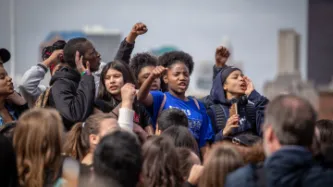Advanced Search
Content Type: Examples
The rise of social media has also been a game changer in the tracking of benefits claimants. Back in 2009, the case of Nathalie Blanchard a woman in Quebec who had lost her disability insurance benefits for depression because she looked “too happy” on her Facebook pictures had made the news.
https://abcnews.go.com/Technology/AheadoftheCurve/woman-loses-insurance-benefits-facebook-pics/story?id=9154741
Author: Ki Mae Heussner
Publication: ABC News
Content Type: Examples
Before and after the Italian election on 4 March 2018, concerns were raised about the spread of misinformation, disinformation and inflammatory content through a network of news sites and Facebook pages.
In November 2017, in the run up to the election, Buzzfeed reported on links between a large network of Italian news websites (175 domain names) and Facebook pages owned by a media network company Web365 – that represents one of the most popular alternative media operations in Italy including…
Content Type: Examples
In an experiment conducted by Fabio Chiusi and Claudio Agosti during the 2018 election season and set out in detail in their report for Tactical Tech, the duo sought to investigate the Facebook algorithm that powers users’ news feed and the algorithm’s treatment of political content. One of the experiment’s goals was to observe how perception of reality is algorithmically shaped in the context of an electoral campaign. In order to do this, Chiusi and Agosti created six bot accounts on Facebook…
Content Type: Explainer
It’s tough to minimise targeted ads on phones because ads can be delivered based on data from the device level (such as what operating system your phone is using or based on unique numbers that identify your phone), browser level (what you search for within a browser), and within the apps you use. An app could target ads at you based on your location (tied to your unique device id number(s)) for example. Apps, including Instagram, direct you to opt-out of targeted ads at the device level.…
Content Type: Examples
In February 2019, an examination of Facebook's searchable database of Indian political ads showed that in India political ads on Facebook were viewed nine times more often by men than by women. Facebook's Indian user base was reported as 24% female in 2016. The reason for the disparity in ad viewing is unclear: deliberate gender-based targeting of Facebook users, the demographics of the population attracted by the pages on which the ads appear, or the levels of Facebook penetration in the…
Content Type: Examples
In January 2019, Facebook announced that as of February 28 the site would add more information to that displayed when users click on the "Why am I seeing this?" button that appears next to ads on the service. Along with the brand that paid for the ad, some of the biographical details they'd targeted, and whether they'd uploaded the user's contact information, Facebook would also show when the contact information was uploaded, whether it was by the brand or one of their partners, and when access…
Content Type: Examples
In January 2019, the British transparency NGO WhoTargetsMe, Mozilla, and the US investigative journalism site Pro Publica reported that recent changes in the social network's code were restricting their ability to monitor political ads on Facebook. The company said the changes were part of a crackdown on third-party plug-ins such as ad blockers and ad scrapers accessing data on the site without authorisation; however, the 20,000 users of WhoTargetsMe's plug-in had specifically chosen to share…
Content Type: Examples
In January 2019, Facebook announced it would extend some of the rules and transparency tools it developed for political advertising for upcoming spring elections in Nigeria, Ukraine, India, and the EU. In Nigeria, the site will bar electoral ads from advertisers outside the country where the election is being held, build a searchable library of electoral ads and retaining them for seven years, check the identity of individuals buying political ads against government-issued documents, and…
Content Type: Examples
In January 2019, Facebook' announced it had removed multiple pages, groups, and accounts coordinating inauthentic behaviour on Facebook and Instagram that were set up by two unrelated operations originating in Russia. One of these operated 364 pages and accounts was active in the Baltics, Central Asia, the Caucasus, and Central and Eastern European countries; the other ran 107 Facebook pages, groups, and accounts, as well as 41 Instagram accounts, and was specific to Ukraine. The company…
Content Type: Examples
In a November 2017 report, Facebook's security group outlined the steps it would take to combat new forms of misuse of the platform, including attempts to deceive people and manipulate civic discourse at low cost or risk to the organisers. Among the drivers, the group cited the global reach Facebook affords and the fact that everyone on social media can act as an amplifier. The group said it intended to collaborate with others to find industry solutions to fake news; disrupt economic incentives…
Content Type: Examples
In 2019, a prominent page on the Facebook Business site cited the British Conservative Party as a "success story" at the 2015 general election, which put the party into power with a narrow majority. The site boasted that via Facebook the Conservatives had an 80.6% reach in key constituencies, 3.5 million video views, and a social context for 86.9% of all the ads served - and that as a result the party had defied the polls and achieved an outright majority.
https://en-gb.facebook.com/business/…
Content Type: Examples
A December 2018 analysis found that Facebook's measures for improving election security and discouraging anonymous political messages were poorly executed and inconsistently applied, and placed an unfair burden on charitable organisations and small businesses while simultaneously being easy for organised and well-funded actors to bypass. Facebook blocked non-profits such as New York's Nuyorican Poets Cafe, Arts Japan 2020, and the Boston Museum of Fine Arts from promoting "harmless" postings.…
Content Type: Examples
Facebook's latest tool for inspecting political ads showed that in the run-up to the US mid-term elections in November 2018, many of the same politicians who had been questioning Facebook about privacy and leaked user data were spending campaign funds on advertisements on the service. Between 2014 and 2018, the digital percentage of political spending rose from 1% to 22% (or about $1.9 billion); between May and November 2018 political spending on Facebook and its subsidiaries came to nearly $…
Content Type: News & Analysis
Planning and participating in peaceful protests against governments or non-state actors’ policies and practices requires the capacity of individuals to communicate confidentially without unlawful interference. From protests in support of LGBTI rights to protests against specific projects that undermine local communities’ wellbeing, these movements would not have been possible without the ability to exchange ideas and develop plans in private spaces.
Unlawful interference with…
Content Type: Examples
In 2018, changes to Apple's rules for data collection led Facebook to withdraw its Onavo Protect VPN app from the app store. The app's function was to warn users when they were visiting potentially harmful websites and protected their data when using public wifi. However, the app also collected data on the other apps installed on the device, monitoring that violates Apple's changed rules. In response to accusations that Facebook used the data to identify and acquire competitors, the company…
Content Type: Examples
Affiliate marketers, who buy ad space in bulk, run campaigns, and earn commissions on the sales they generate, are behind some of the shady and misleading ads that pollute social media and the wider internet, despite also promoting some legitimate businesses such as Amazon and eBay. At one of several yearly conferences, a Berlin event sponsored by Stack That Money, included representatives from Facebook, "Your Computer May Be Infected", "You Won an iPhone", a Russian promoter of black mask face…
Content Type: Examples
In October 2018, researcher Johannes Eichstaedt led a project to study how the words people use on social media reflect their underlying psychological state. Working with 1,200 patients at a Philadelphia emergency department, 114 of whom had a depression diagnosis, Eichstaedt's group studied their EMRs and up to seven years of their Facebook posts. Matching every person with a depressive diagnosis with five who did not, to mimic the distribution of depression in the population at large, from…
Content Type: Examples
In 2018, WhatsApp founder Brian Acton responded to the Cambridge Analytica scandal by tweeting "It is time. #deletefacebook." He also left the company, walking away from $850 million in unvested stock rather than accede to Facebook's plans to add advertising and commercial messaging, a purpose at odds with WhatsApp's encrypted environment. In 2014, Acton and his co-founder Jan Koum, sold WhatsApp to Facebook for $22 billion. Acton's wanted instead to monetise WhatsApp by charging users tiny…
Content Type: Examples
After a series of scandals, in the year up to September 2018 54% of American Facebook users had changed their privacy settings and 42% had skipped visiting the platform for several weeks or more. About 26% said they had deleted the Facebook app from their smartphone. Some 74% of Facebook users had taken at least one of these three actions, split evenly across Democrats and Republicans. Across age groups, younger users (18 to 29) were more likely to have deleted the app (44%), and only a third…
Content Type: Examples
Even after 2015, when Facebook said it had walled off user records from third parties, inside sources and court documents showed that the company went on maintaining a whitelist of companies that were allowed customised access to information about users' Friends, phone numbers, and a "friend link" metric that measured the degrees of separation. Whitelisted companies included Nissan and Royal Bank of Canada, and others that either advertised on the network or were valuable to Facebook for other…
Content Type: Examples
In July 2018, Facebook announced it was investigating whether the Boston-based company Crimson Hexagon had violated the company's policies on surveillance. Crimson Hexagon markets itself as offering "consumer insights". Its customers include a Russian non-profit with ties to the Kremlin, and multiple US government agencies. After pressure from civil liberties groups, Facebook put a policy in place in March 2017 barring the use of members' data for the purposes of government surveillance.…
Content Type: Examples
In May 2018 Facebook announced it would partner with organisations in places such as Myanmar and South Sudan in order to develop more "context-specific" knowledge about how its platform is being abused to create real risks of harm and violence. In Myanmar, where telephone companies allowed Facebook to offer free access, the number of users rose in tandem with the amount of online hate speech, most of it directed against the country's Muslim minority. Facebook wound up withdrawing its Free…
Content Type: Examples
In 2018, experiments showed that despite the company's denials, ads could be targeted at specific Facebook users via information that the users had never given Facebook, such as phone numbers.
The reason: Facebook allows advertisers to upload their own lists of phone numbers of email addresses, and the service will use them to put ads in front of users associated with those details. The company also uses information supplied for security purposes, including phone numbers provided for two-…
Content Type: Examples
In June 2018 Facebook announced it would install new controls to improve members' understanding of how companies targeted them with advertising, including letting them know if a data broker supplied the information. This was the second update to the company's policies in 2018; in March it attempted to ban the use of data brokers but pulled back when advertisers threatened to pull their business.
https://uk.reuters.com/article/us-facebook-privacy-broker/facebook-releases-new-privacy-safeguards-…
Content Type: Examples
Facebook ads purchased in May 2016 by the Internet Research Agency, a notorious Russian troll farm, urged users to install the FaceMusic app. When installed, this Chrome extension gained wide access to the users' Facebook accounts and web browsing behaviour; in some cases it messaged all the user's Facebook Friends. The most successful of these ads specifically targeted American girls aged 14 to 17 and said the app would let them play their favourite music on Facebook for free and share it…
Content Type: Examples
Under a clause in the country's computer crime act that criminalises uploading content that is false or causes "panic", in 2018, Thailand's ruling military junta pursued a criminal investigation into a live feed on the Facebook page belonging to the rising Future Forward Party. The postings claimed that the governing party, the National Council for Peace and Order, which seized power in 2014 was using the threat of lawsuits to recruit former MPs from rival parties. The NCPO has promised to hold…
Content Type: Examples
In the run-up to the November 2018 US midterm elections, Vice tested Facebook's new system of mandatory "Paid for" disclosure intended to bring greater transparency to the sources of ads relating to "issues of national importance". Placing political ads requires a valid ID and proof of residence. Vice found that Facebook quickly approved ads the site attempted to place that named Islamic State, US vice president Mike Pence, and Democratic National Committee chair Tom Perez in the "Paid for"…
Content Type: Examples
In the run-up to the 2018 US mid-term elections, researchers found that the dissemination of fake news on Facebook was increasingly a domestic American phenomenon rather than, as in the 2016 presidential election, an effort driven by state-backed Russian operatives. Removing such accounts (Twitter) and pages (Facebook) is tricky in the US, where the boundary between free speech and disinformation is particularly sensitive. In addition, domestic disinformation is harder to distinguish. One of…
Content Type: Examples
In 2014, a team of four Swedish and Polish researchers began scraping every comment and interaction from 160 public Facebook pages. By two years later, they had collected one of the largest sets of user data ever assembled from the social network; it enabled them to track the behaviour of 368 million members. Techniques like those the researchers used have been used by scholars around the world for a decade to compile hundreds of Facebook data sets of all sizes. Many have been used for research…
Content Type: Examples
Between May 18 and May 22, a bug in Facebook's system changed the settings on 14 million users' accounts so that newly posted updates they thought were private might have been made public instead. The company attributed the error to a mistake made in redesigning how the public parts of user profiles are displayed. After Facebook found the bug, it was another five days before all privacy settings were correctly restored.
https://www.washingtonpost.com/news/the-switch/wp/2018/…




























